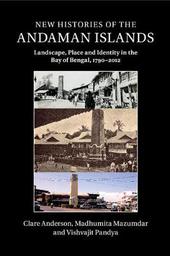
|
New Histories of the Andaman Islands: Landscape, Place and Identity in the Bay of Bengal, 1790-2012
Paperback / softback
Main Details
| Title |
New Histories of the Andaman Islands: Landscape, Place and Identity in the Bay of Bengal, 1790-2012
|
| Authors and Contributors |
By (author) Clare Anderson
|
|
By (author) Madhumita Mazumdar
|
|
By (author) Vishvajit Pandya
|
| Physical Properties |
| Format:Paperback / softback | | Pages:342 | | Dimensions(mm): Height 230,Width 153 |
|
| Category/Genre | Asian and Middle Eastern history |
|---|
| ISBN/Barcode |
9781107434028
|
| Classifications | Dewey:954.88 |
|---|
| Audience | | Professional & Vocational | |
|---|
| Illustrations |
29 Halftones, black and white
|
|
Publishing Details |
| Publisher |
Cambridge University Press
|
| Imprint |
Cambridge University Press
|
| Publication Date |
8 March 2018 |
| Publication Country |
United Kingdom
|
Description
This innovative, multidisciplinary exploration of the unique history of the Andaman Islands as a hunter-gatherer society, colonial penal colony, and state-engineered space of settlement and development ranges across the theoretical, conceptual and thematic concerns of history, anthropology and historical geography. Covering the entire period of post-settlement Andamans history, from the first (failed) British occupation of the Islands in the 1790s up to the year 2012, the authors examine imperial histories of expansion and colonization, decolonization, anti-colonialism and nationalism, Japanese occupation, independence and partition, migration, commemoration and contemporary issues of Indigenous welfare. New Histories of the Andaman Islands offers a new way of thinking about the history of South Asia, and will be thought-provoking reading for scholars of settler colonial societies in other contexts, as well as those engaged in studies of nationalism and postcolonial state formation, ecology, visual cultures and the politics of representation.
Author Biography
Clare Anderson is Professor of History at the University of Leicester. She has written widely on the history of penal transportation, including most recently Subaltern Lives: Biographies of Colonialism in the Indian Ocean World, 1790-1920 (Cambridge, 2012). Madhumita Mazumdar is Associate Professor at the Dhirubhai Ambani Institute of Information Communication Technology (DAIICT), Gujarat. She has a specialized interest in the social and cultural history of science and technology in India. She is presently involved in research on the Andaman Islands where she explores the historical legacies of colonial science in the shaping of contemporary developmentalist agendas and tribal welfare policies. Much of her published work derives from her early researches into science and the cultural politics of nationalism in colonial Bengal. She has also co-authored articles with Vishvajit Pandya on the contemporary history of tribal welfare of the Andaman Islands. Vishvajit Pandya earned his Doctorate in Anthropology from the University of Chicago in 1987. Since 1983 he has been involved with ethnographic research on the Andaman and Nicobar Islands. Apart from numerous papers in academic journals, he has published two major books: Above the Forest (1993) and In the Forest (2009). He has held teaching positions in the USA and New Zealand, and is at present Professor of Anthropology at the Dhirubhai Ambani Institute of Information Communication Technology (DAIICT), Gujarat. He is also the founder and honorary director of the Andaman Nicobar Tribal Research Institute (ANTRI) at Port Blair in the Andamans.
Reviews'This brilliant and groundbreaking book is an interdisciplinary collaboration between three leading scholars. It situates the Andaman Islands within multiple scales of imperial and national history, while remaining deeply attentive to the textures of local society. It will be essential reading for scholars of modern South Asia and the Indian Ocean, historians of imperialism, and historians of global migration.' Sunil Amrith, Harvard University, Massachusetts 'The Andaman Islands are the 'entangled landscape' par excellence. The authors, two historians and an anthropologist, collaborate to unravel the tangles in this fascinating study. These distant islands, lying far south of Burma in the Bay of Bengal, symbolize remoteness. Home of indigenous people who stood as the representative 'primitive' hunter-gatherers to generations of anthropologists, the Andamans were turned into a laboratory of colonial experiments. First a penal colony for common criminals, then the place of exile for 1857 'mutineers', then a prison for freedom fighters, the Andamans were captured by Japan during World War II. After the War and Indian independence, the government has sought to make this distant territory a refuge for people displaced by Partition, a 'normal' part of India, and a tourist destination. As the wide-ranging scholarship of this book demonstrates, every step taken over more than two centuries has created yet another tangle in this landscape.' Ralph W. Nicholas, University of Chicago 'Landscape and settlement, memory and narrative, the visual, the archival and the experiential - all come together in this remarkable, multidisciplinary account of the making of the modern Andamans. The authors radically transform our understanding of these islands, their complex histories and intersecting ethnographies and their equivocal place in empire and nation.' David Arnold, University of Warwick 'Drawing inspiration from the disciplines of history, anthropology and historical geography, this book presents a new perspective on the colonial and contemporary history of the Andaman Islands. In a series of compelling studies of landscape and memory, the authors combine archival and ethnographic approaches to explore the complex and contested processes of place-making through which the patterns of history take their shape and meaning in the present.' Felix Driver, Royal Holloway, University of London 'The joy of New Histories [of the Andaman Islands] lies in its plentiful and compelling detail of overlooked or occluded stories, events, places, and groups. ... The book is at its best when dealing with the intimate, especially when demonstrating that intimacy need not be local and isolated but can involve long-distance materials and imaginings.' Thomas Simpson, Journal of Historical Geography '... this volume undertakes a competent survey of the Andaman Islands' post-1923 social history and is a valuable addition to the burgeoning field of the social history of the Andamans ...' Aparna Vaidik, The American Historical Review
|